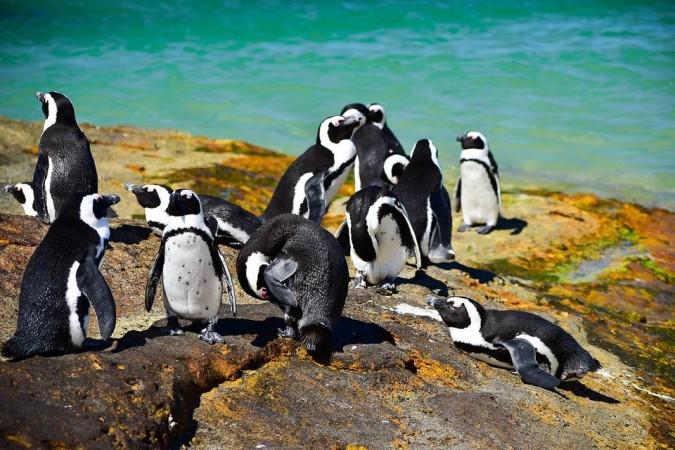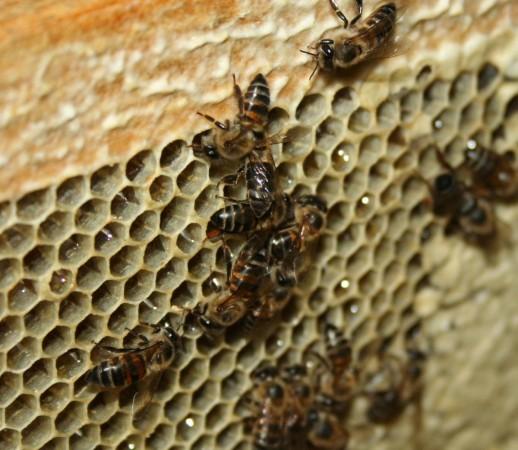In an unfortunate blow to the endangered African penguins (Spheniscus demersus), 63 birds of the species are suspected to have been killed by a swarm of bees on a beach outside South Africa's capital city of Cape Town. The announcement was made by the Southern African Foundation for the Conservation of Coastal Birds (SANCCOB) and the South African National Parks (SANParks) on Sunday.
The dead birds were found on Friday morning and belonged to a colony—Boulders African penguin colony— at Simonstown, a small town around 40 km from Cape Town. The area where the bee attack occurred is a national park, and the attacking Cape honey bees (Apis mellifera capensis) are part of the ecosystem there.
"After tests, we found bee stings around the penguins' eyes," said the foundation's David Roberts, a clinical veterinarian. This is a very rare occurence. We do not expect it to happen often, its a fluke. There were also dead bees on the scene," Dr. David Roberts, a clinical veterinarian at SANCCOB, told a news agency.
Dozens of Penguins Found Dead

In a statement, the SANParks said that the deaths occurred sometime between Thursday afternoon and Friday morning. A team of experts from SANCCOB and SANParks began investigating the possible causes of death. The deceased birds were taken for autopsies to SANCCOB.
"No external physical injuries were observed on any of the birds. The post-mortems revealed that all the penguins had multiple bee stings, and many dead bees were found at the site where the birds had died," the statement informed.
The SANParks also stated that a dead penguin was found on Fish Hoek beach(around 34 km from Cape Town) on Friday. It was confirmed by the SANCCOB vet that this penguin also had multiple bee stings. "However, samples are still being tested for other toxicity possibilities and diseases to rule out any other potential cause," said the statement.
An Endangered Species

The freak incident is a serious loss to the population of African penguins. They are an endangered species and are on the International Union for Conservation of Nature's (IUCN) Red List of Threatened Species. Their populations are confined to the waters of southern Africa, and they breed on 25 islands and four sites on the mainland in South Africa and Namibia. However, they have been found in regions as far north as Mozambique and Gabon.
All their breeding sites in South Africa are nature reserves, national parks, or are protected. The African Penguin is a protected species. It is listed on Appendix II of the Convention on International Trade in Endangered Species (CITES) and is also on Appendix II of the Convention on Migratory Species (CMS).
Commenting on the incident, Dr. Roberts expressed, "The penguins... must not die just like that as they are already in danger of extinction. They are a protected species," according to AFP
Rare But Deadly

Bee attacks against human beings are known to occur occasionally. It is not unusual to come across reports or pictures of individual animals such as pets suffering from bee stings on social media. An attack of this magnitude is seldom heard of.
However, there are few reported cases in recent times of bee attacks that have resulted in the death of more than one animal. In May 2020, three dogs were killed by a swarm of bees in Tuscon, Arizona. The Tuscon Fire Department informed in a series of tweets that while one dog succumbed immediately after the attack, the others passed away shortly after arriving at the vet.
In July 2021, a swarm of over 5,000 bees attacked a resident of Diamond Bar, California, and the pets in his home. He was stung over 40 times. His pet, Rolo, a chocolate Labrador retriever, survived. However, two smaller dogs that belonged to his daughter did not. Despite these rare occurrences, it is important to note that different species of bees play crucial roles in different ecosystems. From pollination to the production of honey, bees serve several purposes.








